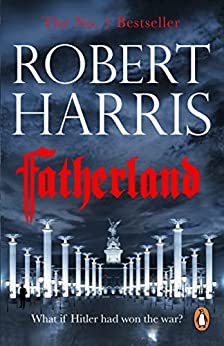This week it’s the letter F in Kerrie’s Crime Fiction Alphabet. I’ve chosen Fatherland by Robert Harris.

It’s a fast-paced thriller set in Germany in 1964, but not the historical Germany of that date, because Hitler is approaching his 75th birthday, and Germany had won the Second World War ‘“ it’s historical fiction that never was ‘“ an alternative history. And yet many of the characters actually existed, their biographies are correct up to 1942 and Harris quotes from authentic documents in the book. The Berlin of the book is the Berlin that Albert Speer planned to build.
What is definite is that this is a murder mystery, beginning with the discovery of the naked body of an old man, lying half in the Havel, a lake on the outskirts of Berlin. The homicide investigator is Xavier March of the Kriminalpolizei (the Kripo) and the victim is Josef Buhler, one of the former leading members of the Nazi Party who had been instrumental in devising ‘˜the final solution’. As March digs deeper, despite being taken off the case by the Gestapo, he discovers a larger conspiracy as more of the former leading Nazis are murdered.
March is in some ways a typical cop, disillusioned, sceptical and suspicious of authority. He’s also divorced and losing the respect of his son, with disastrous effects. He isn’t the only one investigating the deaths. Charlie Maguire, a female American journalist has her own reasons for wanting to uncover the murderer and together they travel to Zurich to inspect the private Swiss bank account of one of the victims.
It’s a complex book and leads March into a very dangerous situation as he discovers the truth. It’s a real page-turner, full of suspense and consequently I read it very quickly, eager to know what happened next and what lay behind the murders. The ending is suitably ambiguous – it’s not the sort of book where all the loose ends are neatly tied up. Neither is the alternative history element dominant, although I did find all the little details fascinating. For example Churchill and the Royal Family have gone to Canada and Joseph Kennedy is the US president. It is predominantly crime fiction, that makes you think about the nature of good and evil and about the ways in which society handles corruption.
It does sound like a complex book. I like the mystery set in that time period and setting.
LikeLike
I’ve never read an alternative WWII history novel (not one I can remember, anyway) so I’m intrigued!
LikeLike
Margaret – What an interesting contribution! I do enjoy historical crime fiction, but I must admit that I haven’t read much alternative-history crime fiction. It’s an interesting premise and it does sound like a complex book that one mulls over as one reads.
LikeLike
Margaret: While it has been some years since I read Fatherland it has stayed with me. I found the historical scenario all too convincing and the mystery disturbing. I was left feeling unsettled. I thought it was a good book.
LikeLike
Hi Maragaret,
You have really piqued my interest with your great analysis and review of this story. ‘Fatherland’ is always a book that I have passed by whenever I have come across it on sale, assuming that it isn’t something which I would enjoy and never having bothered to research or follow up on any reviews for it.
It sounds as though the book asks a lot of ‘what if?’ questions of the reader and really makes you concentrate on the storyline. As it is a thriller as well, I might well be tempted to pick this one up next time I come across it and given the state of world economic affairs right now, the notion of Germany having won the war, may not be quite so far fetched!!!
Thanks for making me think about this book in a new light.
Yvonne
LikeLike
I have this one and SS-GB by Len Deighton on my To Be Read stack. SS-GB is similar concept but set in the UK around 1941. Your review makes me want to read both of them. Soon.
LikeLike
Great choice – I am a real sucker for counter-factual history novels. I do like this one though I did find the ending a bit disappointing actually. My favourites would also have to include the already-mentioned Len Deighton’s SS-GB and Philip K. Dick’s more outlandish THE MAN IN THE HIGH CASTLE. Harris’ follow-up ARCHANGEL takes a more subtle approach to alternative history but in some ways I preferred it, probably because the historical element prediminated less and made the conclusion (to me) more satisfying.
LikeLike
This seems interesting but not really my cup of tea as I am a little tired of reading alternate histories. How many times and in how many ways will Hitler be cashed?
LikeLike